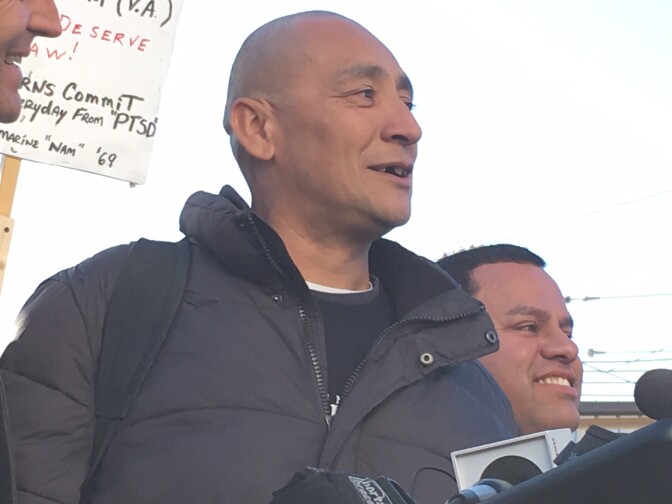This story is free to read because readers choose to support LAist. If you find value in independent local reporting, make a donation to power our newsroom today.
This archival content was originally written for and published on KPCC.org. Keep in mind that links and images may no longer work — and references may be outdated.
After 15 years, deported Marine Corps veteran is home for Christmas

Marine Corps veteran Marco Chavez hugged his father at the border crossing in San Diego on Thursday, when he stepped onto American soil for the first time since his deportation 15 years ago.
“It was good [because] I knew I wasn’t hugging him and he was going to leave,” Chavez said. “This time, I gave him a hug and knew I was going home with him.”
Nathan Fletcher, chair of the advocacy group Honorably Discharged, Dishonorably Deported, was the second person Chavez hugged. Fletcher, along with ACLU attorneys, helps lobby to allow deported veterans to return home.
“It’s the greatest feeling to see a veteran return to the country that he was willing to give his life to defend,” Fletcher said. “It motivates us all to redouble our efforts to help everyone else who’s still left.”
Chavez is 45 years old. He was brought to the U.S. when he was a year old and grew up in Los Angeles. He enlisted in the Marine Corps at 19 and was honorably discharged after serving four years.
His path to deportation began with a 1998 animal cruelty conviction for beating a dog. That sent him to state prison for 15 months. The ACLU says an immigration judge later deemed the offense an aggravated felony, making Chavez eligible for deportation.
“It seemed to be unfair, because it didn’t seem like they took it into consideration that I served the country,” Chavez said.
He had to learn Spanish when he was sent to Mexico in 2002.
For Chavez, the hardest part of deportation was being separated from his family. His wife and three sons first came to live with him in Tijuana, but the family struggled, and eventually moved back to the U.S. and settled in Iowa. The boys spent much of their childhood without a father.
Chavez’s parents still reside in L.A., and he plans to stay with them for the first few months of his return to the U.S. before moving to Iowa to reconnect with his children.
California Governor Jerry Brown paved the way for this homecoming by pardoning Chavez and two other deported veterans ahead of the Easter holiday in April of this year.
Chavez “served our country, earned a pardon and deserves to come back home,” Brown said.
Last month, an immigration judge agreed to reopen and terminate his removal proceedings.
It’s unclear how many military servicemembers face the same fate as Chavez. Green card holders are eligible to enlist in the armed forces, and thousands of legal permanent residents have served, despite not having U.S. citizenship.
Military service can speed up naturalization, but many still fall through the cracks. Some servicemembers, like Chavez, say they didn’t realize they could apply for U.S. citizenship. Others report being confused by the process.
“That’s the irony. They were eligible for citizenship, but it was never facilitated,” said Norma Chavez-Peterson, executive director of the ACLU of San Diego and Imperial Counties. She said Chavez will now have a fast-track to naturalization, because of his time in the Marine Corps. “If they had their citizenship, after committing a crime, they still would have done their time, but wouldn’t have to be banished from the country they served.”
There are just over 11,000 non-citizens in the military, a number that’s dropped considerably since the Pentagon began a program offering naturalization services during basic training in 2009.
KPCC reported on this phenomenon in a two-part series earlier this year, in collaboration with The American Homefront Project. Part one is available here.
Immigration and Customs Enforcement does not track the number of deported individuals who are veterans. Nathan Fletcher has documented 300, but “there are potentially thousands,” he said. His organization is pushing for change at the federal level.
“We would like to see Congress pass legislation that says if you are honorably discharged from the U.S. military, you are a citizen,” Fletcher said.
The ACLU of California released a report last year, titled “Discharged, then Discarded: How U.S. veterans are banished by the country they swore to protect.” It examines 80 cases of foreign-born service members who have been deported or face deportation proceedings.
The Associated Press contributed to this report.







